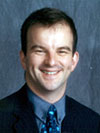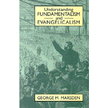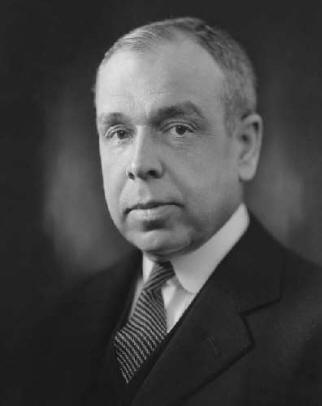
The article below is in the latest edition (33.2 (2008)) of
Themelios hereMinority Report
The Second Most Important Book You Will Ever Read
— Carl Trueman —
Carl Trueman is Academic Dean, Vice President of Academic Affairs, and Professor of Historical Theology and Church History at Westminster Theological Seminary in Philadelphia, Pennsylvania.
In the lounge next to my office hang the portraits of a number of the founding faculty of my institution, Westminster Theological Seminary in Pennsylvania. There is one of John Murray, the dour-looking Scotsman with the glass eye. Legend has it that you could tell which eye was the real one because that was the one which did not smile. There is one of Ned Stonehouse, whose good looks in early faculty photos would seem more appropriate to a Hollywood heart-throb of the 1930s than a learned professor of New Testament. Then above the fireplace, now somewhat moth-eaten and in need of restoration, is the magnificent portrait of the founder of the Seminary, the great J. Gresham Machen, a name synonymous with both exacting orthodox scholarship on the New Testament and, more than that, valiant struggle for the truth in both church and seminary.
Machen had a stellar academic background: he studied at Johns Hopkins in Baltimore, then Princeton Seminary under the great B. B. Warfield, and also in Germany where his mind was set on fire by the passionate liberalism of the wild yet brilliant Wilhelm Herrmann. Yet in the 1920s and ’30s he became a passionate advocate for Christian orthodoxy amidst the conflicts that were shaking both Princeton, where he was a professor, and the Presbyterian Church of which he was a member and an office-bearer. The result of these conflicts was the founding of (1) Westminster Theological Seminary in 1929 as an institution committed to continuing the teaching of theology according to the Westminster Confession of Faith and Catechisms and (2) the Orthodox Presbyterian Church in 1936 as a church committed to maintaining biblical church standards in doctrine and life.
Machen also possessed a key quality which is evident in many of the great church leaders throughout history: the ability to write and communicate at both a high scholarly level (as in his book on the virgin birth) and at the level of the ordinary (if there is such a thing) believer in the pew, and to do the latter in a manner which is not condescending or patronizing. His was a rare gift indeed. Among the greatest examples of this in the Machen corpus is his remarkable little book, entitled simply Christianity and Liberalism, a book still kept in print by Eerdmans, the American publisher.
The thesis of the book is devastatingly simple: Christianity, built on the authoritative, divinely inspired, inerrant revelation of God in Scripture, embodying a robust supernaturalism, and focused on the exclusivity of salvation in the person and work of Christ, is a different religion to that liberalism that repudiates each of these things.
In an age like ours, of course, where fuzzy boundaries, vagueness, doubt, and caution are supreme virtues, Machen’s thesis is likely to appear both arrogant and overstated. But, as Machen himself says in the opening paragraphs, "In the sphere of religion, as in other spheres, the things about which men are agreed are apt to be the things that are least worth holding; the really important things are the things about which men will fight." There is insight here. Before we see Machen as too intolerant, too much a man of a bygone age, let us reflect on the fact that we live in an age that is remarkably certain and intolerant on a whole host of fronts, from racism to poverty to cruelty against animals to homophobia. Regardless of where we come down on each of these issues, very few of us will be indifferent on them, or particularly laissez-faire towards those with whom we disagree on these matters.
Thus, it is not really that Machen is a man of a bygone, intolerant age which makes this little book so offensive to modern ears. We should not flatter our own enlightened times so easily, for it is not the reality of intolerance in itself that has changed. Rather, it is that we now have a different set of issues that arouse intolerance, and this change reflects not only shifting values in society but also in the church, to the extent that she no longer stands intolerantly for her truth as she once did. The question is thus not whether we are intolerant: we surely are. The question is rather: Are we intolerant of the right things? As the value of religious truth has become negligible, so the passions aroused by such in the wider world have died down. That we do not fight over these things is not a virtue; it is rather be a sign that we just do not care about them any more, and that is the result of the downgrading of the Bible in our thinking. We no longer look on it as a book of divine truth and thus of almost unbearable importance; it is now a ragbag of disparate religious reflections, or a collection of texts reflecting on religious psychology, or simply a cacophony of ancient near-eastern tribal mythology.
For Machen, however, the Bible contains truth, and as such is ineradicably doctrinal. Indeed, one
overarching concern in Christianity and Liberalism is simply the vital importance of Christian doctrine to the church: doctrine, he makes clear, is the very heart of Christian testimony. Claiming to honor the Bible without synthesizing the Bible’s teaching into doctrine, into systematic theology, is not really honoring the Bible at all, for the Bible teaches truth, truth which is coherent and can be articulated; and regarding with indifference those things which the Bible clearly sees as important is, in some sense, the worst sin of all. In a memorable passage, Machen discusses how it was a tragedy that Luther and Zwingli fell out so badly over the nature of Christ’s presence in the Lord’s Supper, but how it would have been an even greater tragedy had they simply agreed to differ on the grounds that the matter was of no importance.
Given this doctrinal concern, those who follow Machen in this regard are unlikely to win many friends or influence people in today’s Christian world, where the great doctrines of the faith are often considered less significant than positions on social issues, whether it be the current conservative passion for Christian and home schooling, or the left’s zeal for issues of social justice. Pragmatics—what we do, what results we achieve—has real priority over what we believe and stand for every time. Yet for those who wish to stand within the stream of historic, biblical Christianity, Machen’s book represents a clarion call to action: Christians must realize the essentially doctrinal core of their faith and fearlessly stand upon such without compromise.
The book is also full of pithy sayings that repay careful reflection. Here are a few examples:
"Christ Died"—that is history; "Christ died for our sins"—that is doctrine. Without these two elements, joined in an absolutely indissoluble union, there is no Christianity (27).
When it is once admitted that a body of facts lies at the basis of the Christian religion, the efforts which past generations have made toward the classification of the facts will have to be treated with respect (46).
The modern liberal preacher reverences Jesus; he has the name of Jesus forever on his lips; he speaks of Jesus as the supreme revelation of God; he enters, or tries to enter, into the religious life of Jesus. But he does not stand in a religious relation to Jesus. Jesus for him is an example for faith, not the object of faith (85).
[L]iberalism within the "evangelical" churches is inferior to Unitarianism. It is inferior to Unitarianism in the matter of honesty. In order to maintain themselves in the evangelical churches and quiet the fears of their conservative associates, the liberals resort constantly to a double use of language (111).
Narrowness does not consist in definite devotion to certain convictions or in definite rejection of others. But the narrow man is the man who rejects the other man’s convictions without first endeavoring to understand them, the man who makes no effort to look at things from the other man’s point of view (160).
These are typical of the sentiments throughout the book. My own copy has barely a page without some paragraph, sentence, or clause underlined. It is refreshing to read a book that is as clearly thought out as it is written. But the bottom line is not Machen’s style or his logical precision or the passion of his rhetoric. It is his basic point: Christianity and liberalism are two different religions. The difference between them is not a quantitative one, of a system of 100% truth over against a system of 75% truth; rather it is a qualitative one of truth to falsehood, of worship to idolatry, of that which brings blessing to that which ultimately brings only a curse.
That is a crucial message for the church today, particularly for those involved in academic study. Certainly Christianity is no excuse for obscurantism. It is important—indeed, it is a Christian imperative—that we understand and treat fairly the views of opponents, whoever they may be. Intentionally to distort the views of an opponent in order to win an argument is a breach of the ninth commandment and not an option for a disciple of Christ. Nor is Christianity an excuse for being rude and curmudgeonly towards those with whom we disagree. But let us be clear: the supernatural Christianity of the authoritative and divinely inspired Scriptures stands in opposition to all other religious systems, even those that use Christian jargon while yet denying the faith’s basic foundations.
Study can be seductive. The realization that professors who spend their days undermining the faith are actually pretty decent people, interesting and delightful company, loving to their wives and children, and often more likeable than their orthodox counterparts, can produce crises of faith among students more often than many would imagine. The attractive power of real learning should never be underestimated. What Machen’s argument makes clear, however, is that truth is not personal. It is truth, and conformity with such is what is important, not whether we like the people advocating it or not. That Christ has died is fact. That he died for my sins is doctrine. That the person telling me this might be less likeable than that really decent and friendly professor who denies the resurrection is irrelevant.
Theological students should reach for Machen’s little book every year to remind themselves that
orthodoxy does not equate to obscurantism, but that there is something really at stake here in the struggle between orthodox, supernatural Christianity and everything else. Indeed, I would venture to say that this is the second most important book that theologians could ever read. As to the first: well, if you don’t know what that is, read chapter four in Christianity and Liberalism, and hang your head in shame!




 The article below is in the latest edition (33.2 (2008)) of Themelios here
The article below is in the latest edition (33.2 (2008)) of Themelios here
 Terry Chrisope is the author of a Mentor paperback (2000) Toward a Sure Faith: J. Gresham Machen and the Dilemma of Biblical Criticism, 1881-1915. Details here.
Terry Chrisope is the author of a Mentor paperback (2000) Toward a Sure Faith: J. Gresham Machen and the Dilemma of Biblical Criticism, 1881-1915. Details here.

